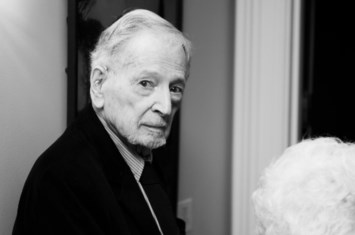
OBITUARIO
Richard Baron
4 abril, 1923 – 9 mayo, 2021

“If anyone was the perfect publisher for the 1960s, it was Richard Baron. He was totally fearless, and he backed us in every crazy thing we would do,” E.L. Doctorow, former Editor-in-Chief, The Dial Press.
Richard Warren Baron, the renowned sixties owner and publisher of The Dial Press, where
he presided over works by James Baldwin and Norman Mailer, and hired E.L. Doctorow as
Editor-in-Chief, died on Sunday, May 9 of natural causes at his home in New York City. He
was 98.
His death was announced by Carole Baron, his wife of 45 years, an editor at Alfred A. Knopf.
A World War Two combat veteran and POW, lifelong fighter for social justice, who
participated in the March on Washington led by Martin Luther King, and a pilot well into his
eighties of his Cessna 182 plane, Baron lived on Shelter Island and in Manhattan.
Wanting to make his mark outside The Royal Paper Company, which was the family
business, Baron bought half-ownership of the Dial Press, an independent publishing house,
which began in 1923. Under his leadership, Dial’s author roster, and their books, included
James Baldwin (“Another Country”), Norman Mailer (“Armies of the Night”), Thomas Berger
(“Little Big Man”), Elizabeth Bowen, Leonard Levin, W.R. Burnett, Howard Sackler (“The Great
White Hope”), Vance Bourjaily, and historical novelist Frank Yerby.
At Baron’s 90th birthday celebration in 2013, Doctorow toasted Baron with the words, “He was
totally fearless and he backed us in every crazy thing we wanted to do.”
In addition to Doctorow, Baron brought on Christopher Lehmann-Haupt as one of his
editors. He also developed close working and personal relationships with many of the
authors he championed.
Three examples:
While finishing his novel “Another Country,” James Baldwin stayed at Baron’s home in
Bedford, New York, writing and playing ping-pong with his publisher’s daughters, who called
him “Jimmy.” As his dinner guest at Baron’s country club in neighboring Purchase, the allwhite
dining members sat in shocked silence—until Mr. Alfred A. Knopf came over to hug
Baldwin, and the diners relaxed.
The Baron and Norman Mailer families summer-vacationed together in Provincetown, where
publisher and author were fierce sailing competitors.
Baron placed Frank Yerby’s photo on the jacket of his historical novels, defying the
conventional wisdom of the times that a Black author photo on popular ction potentially
diminished sales.
In 1969, Baron sold half his interest in Dial to the Dell Publishing Company, later divesting
the rest. Dell eventually became part of Doubleday, which dissolved the imprint in 1985.
The Dial Press was revived in 1993 by Carole Baron, then head of Dell, at Bantam Doubleday
Dell. At her husband’s suggestion, she appointed the late Susan Kamil to run it. Since then, it
has thrived within Penguin Random House’s Random House division as a publisher of award
winners and bestsellers, such as the current “Untamed” by Glennon Doyle.
Post-Dial Press, Baron established the Richard W. Baron Publishing Company, whose
authors included Thomas Berger, Nat Hentoff, and Julius Lester, whose “Revolutionary
Notes” was a major bestseller.
Richard Baron was born on April 4, 1923 to Samuel T. Baron, owner of the Royal Paper
Corporation, and Mabel Levy Baron, and grew up on New York’s Upper West Side. After a
scuffle with a fellow student at PS 166, he was enrolled in Manlius Military Academy, near
Syracuse. Having attended the University of North Carolina, early in World War II he joined
the Army Infantry. His armed-forces education and training had him sent to North Africa in
1943 as a lieutenant. He saw combat at Anzio, after which he was wounded. Before he
returned to the war in Germany, he and a few other Jewish soldiers changed the H (for
Hebrew) on their dogtags to P (Protestant). This saved his life when he was surrounded by
SS units, captured and imprisoned in a POW camp for the war’s final four months. Baron
recounted his experiences in “Raid,” a book that was published in 1981.
Baron retired from book publishing in 1980, dividing his time between Manhattan and his
beloved Shelter Island, where well into his eighties, he sailed his boat and flew his retractable
Cessna 182.
Richard Baron is survived by Carole; his children Amy and Tom from his second marriage to
Virginia Olsen; children Susan, Wendy and Vicki from marriage to his late first wife Pamela
Stearns; three step-children; 17 grandchildren; and great-grandson Asher.
Baron will be buried on Shelter Island in a private ceremony. Memoriam contributions can be
made to the Shelter Island Friends of the Library. www.shelterislandpubliclibrary.org/friendsof-
the-shelter-island-library.
Muestre su apoyo
Comparta Un Recuerdo
Comparta
Un Obituario
Obtenga actualizaciones
DONACIONES
Servicios
COMPARTA UN OBITUARIO
- RECIBIR RECORDATORIOS
v.1.9.6